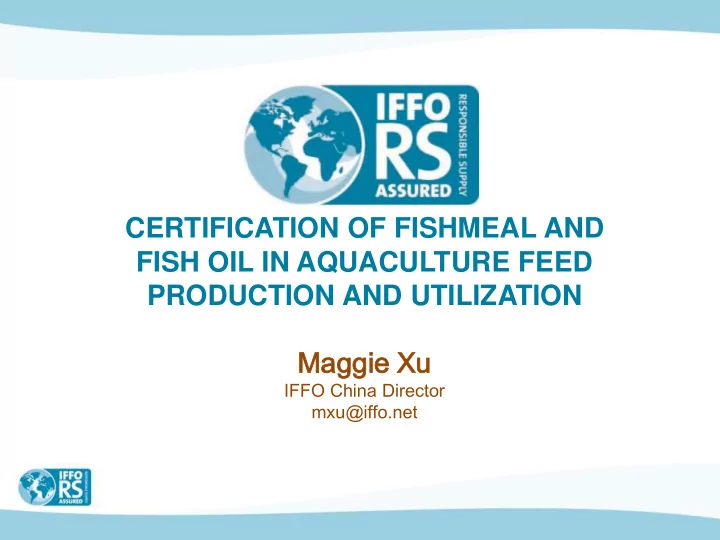

CERTIFICATION OF FISHMEAL AND FISH OIL IN AQUACULTURE FEED PRODUCTION AND UTILIZATION Maggie ie Xu Xu IFFO China Director mxu@iffo.net
IFFO is the global trade association representing marine ingredient producers and others in the supply chain. IFFO RS is an independent third party audit and certification programme that assures the value chain of marine ingredients that are responsibly sourced and responsibly produced. .
WHY BOTHER GETTING MARINE INGREDIENTS CERTIFIED?
MANY FARMERS ARE GETTING THEIR FARMING PRACTICES CERTIFIED •
GAA BAP BAP Feed Mill standard states: .. for fishmeal and fish oil derived from reduction fisheries, at least 50% shall come from sources that are certified by the MSC (Marine Stewardship Council) or to IFFO RS (the International Fishmeal and Fish Oil Organization Responsible standards).(calculation based on mass balance) Alternatively, where MSC- or IFFO RS-certified fishmeal and fish oil are not produced nationally, the above minimum percentage can comprise material from active approved improvers programs as verified by IFFO, the Sustainable Fisheries Partnership and WWF
ASC FEED STANDARD • Currently under-development • Due to be launched in 2017 • Drafts have made reference to IFFO RS and IFFO RS Improvers Programme being acceptable as an entry level for the fisheries whilst MSC remains the long- term goal • Factories will require Good Manufacturing Practice with traceability etc as included in IFFO RS
Increasingly to access some of the biggest and best markets farmed seafood products will have to come with a reassurance : any marine ingredients used in their feed and made from whole fish came from responsibly run factories that sourced their raw material from : responsibly managed fisheries or at least fisheries that are making a credible effort to improve.
3 KEY IFFO RS PRINCIPLES Respons sponsible ible Sour urcing: cing: • of whole fish from fisheries that comply with the key principles of the FAO Code of Conduct for Responsible Fisheries (MSC accepted). • By-products from non-IUU and not on IUCN red list Respons sponsible ible Traceabilit aceability : • of fishmeal and fish oil back to fisheries that are The unit of compliant with the Standard. Certification is the Fishmeal Respons sponsible ible Product oduction ion: Factory not a Fishery • of safe fish meal and fish oil. Entry level requirements covering pollution and social conditions in factory
IFFO RS COMPLIANT MATERIAL – COMBINED WORLD PRODUCTION ('000 MT) 3,000 50% 45% 45% 45% 42% 42% 42% 42% 2,500 41% 41% 40% 38% 38% 37% 37% 35% 2,000 30% 25% 25% 1,500 25% 20% 1,000 15% 10% 500 5% 0 0% 2010 010 2011 011 2012 012 2013 013 2014 014 2015 015 2016 016
IFFO RS COMPLIANT PRODUCTION OF MARINE INGREDIENTS FROM BY-PRODUCTS 700 Tonnage ('000 mt) % of world production 11.7% 14% 600 12% 500 8.6% 10% 7.3% 400 5.5% 8% 300 4.1% 6% 3.6% 200 4% 100 2% 0.0% 0 0% 2010 2011 2012 2013 2014 2015 2016
IFFO RS COMPLIANT MATERIAL – WORLD PRODUCTION 2015 Iceland France 3% <1% UK/Ireland 1% South Africa Chile 1% USA 6% 3% Norway 3% Peru Non - IFFO RS 17% compliant Denmark 58% 3% Mauritius <1% Mexico <1% Faroe Thailand Islands Vietnam 1% 1% 2%
IFFO RS NON - COMPLIANT MATERIAL Others (<1%), Pakistan, 13.4% Russia, 1.3% 1.7% India, 2.4% Morocco, 2.4% IFFO RS, Ecuador, 2.5% 42% Mexico, 2.0% Vietnam, 2.5% Japan, 4.6% Thailand, 8.1% China, 9.5% Possible IFFO RS, 7.7%
THE ASIA ISSUE • Many of the fisheries in Asia are multi- species and can’t be evaluated with conventional methodology • Small artisanal fisheries provide millions of jobs but control is difficult • New approaches needed
IM IMPROVERS ROVERS PROGRAMM OGRAMME E To act as a ladder for fisheries and factories to demonstrate their commitment to achieve the standard
ENTERING THE IMPROVERS PROGRAMME • Third party gap analysis of the factory and its raw materials against RS standard • Implement a structured plan to improve to meet the IFFO RS standard in a reasonable time • In the case of whole-fish raw material the supplying fishery must undertake a credible FIP with milestones agreed by a multi-stakeholder committee • Annual 3rd Party audits are required to ensure milestones are being achieved
HOWEVER It is almost impossible for the fisheries to pass the assessment as it is currently structured.
IFFO RS V2.0 To review the current IFFO RS Fishery Approval Criteria Look at the relevance of existing clauses Proposed inclusion of a risk based assessment Proposed inclusion of criteria addressing mixed fisheries To include Good Manufacturing Practice criteria to the factory assessment Still recognising existing standards (GMP+, FEMAS) Open accessibility to others without above standards To review existing social clauses at the factory Look at the appropriate level To develop IFFO RS V2.0 in accordance with ISEAL codes To show good practice, robustness and credibility To allow recognition and harmonisation with other standards
MULTI-SPECIES FISHERIES V2 Intention to adopt the principles included in the Asia Pacific Fisheries Commission’s (APFIC) recentlypublishedguidelines for the managementoftropicaltrawlfisheries Version 2 should be completed in 2017
NEXT STEPS IN MULTI-SPECIES ASSESSMENT DEVELOPMENT • • • •
NEXT STEPS We are hoping by the end of 2017 to have factories with their associated fisheries in the Improvers Programme from the following countries:
FOR MORE INFORMATION PLEASE VISIT WWW.IFFO.NET/IFFO-RS
Recommend
More recommend